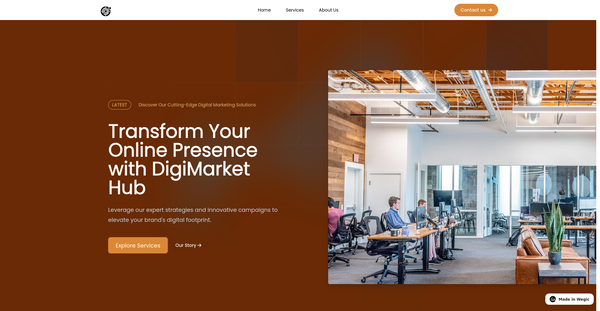What Is Black Friday 3C Web Design?
Getting Started with Black Friday 3C Web Design
Black Friday 3C Web Design
In today’s digital age, having a strong online presence is essential for businesses and individuals alike. Whether you are looking to create a personal blog, launch an e-commerce site, or establish an online portfolio, finding the right web hosting provider is crucial for ensuring your website is secure, reliable, and easily accessible to users. With so many web hosting options available on the market, it can be overwhelming to choose the best provider for your needs. In this article, we will compare various web hosting options and help you make an informed decision.

Getting Started with Black Friday 3C Web Design
Black Friday 3C Web Design
1. Wix
Wix is a popular website builder that offers a wide range of templates designed for churches and religious organizations. With its drag-and-drop interface, users can easily customize their website to reflect their unique style and branding. Wix also offers a variety of features such as event calendar integration, online donation tools, and media galleries for sermons and other resources. Additionally, Wix provides reliable hosting services and SEO tools to help churches reach a wider audience online.
2. Squarespace
Squarespace is another user-friendly website builder that is well-suited for churches looking to create a modern and visually appealing website. With its stylish templates and customizable design options, Squarespace allows users to create a professional-looking site without any coding knowledge. Squarespace also offers features like event scheduling, donation forms, and social media integration, making it easy for churches to engage with their community online. Additionally, Squarespace provides responsive design capabilities, ensuring that your website looks great on any device.
3. Sharefaith
Sharefaith is a website builder specifically designed for churches, offering a comprehensive suite of tools and templates to help churches create a strong online presence. Sharefaith’s templates are tailored for churches and religious organizations, featuring customizable layouts and designs to suit any style. In addition to website building tools, Sharefaith also provides features such as sermon hosting, online giving options, and church management tools. Sharefaith also offers a library of resources including graphics, videos, and worship media to help churches enhance their online presence.
4. WordPress
WordPress is a versatile platform that can be used to create a wide range of websites, including church websites. With its extensive library of themes and plugins, users can easily customize their website to meet their specific needs and preferences. WordPress offers features such as event calendars, donation forms, and sermon hosting capabilities, making it a great choice for churches looking to engage with their congregation online. Additionally, WordPress is known for its robust SEO capabilities, helping churches improve their visibility in search engine results.
5. Weebly
Weebly is a user-friendly website builder that offers a range of features suitable for churches and religious organizations. With its drag-and-drop interface and customizable templates, users can easily create a professional-looking website without any coding knowledge. Weebly also provides features like event calendars, donation forms, and video hosting capabilities, making it easy for churches to share resources and connect with their community online. Weebly also offers reliable hosting services and responsive design options, ensuring that your website looks great on any device.
1. Start with a unique concept
When developing a new recipe, it is important to start with a unique concept that sets your dish apart from others. Consider combining unexpected flavors, using new cooking techniques, or incorporating unusual ingredients to create a recipe that will pique your readers’ interest. You can draw inspiration from different cuisines, culinary trends, or seasonal ingredients to come up with a concept that is both original and appealing.
2. Experiment with different ingredients and flavors
Building recipes is all about experimentation and creativity. Don’t be afraid to try out new ingredients and flavor combinations to create exciting and delicious dishes. Consider incorporating fresh herbs, spices, citrus zest, or other aromatic ingredients to enhance the flavors of your recipe. Experimenting with different cooking techniques, such as grilling, roasting, or braising, can also add complexity and depth to your dishes.
3. Consider dietary restrictions and preferences
When building recipes for your website, it is important to consider the dietary restrictions and preferences of your audience. Make sure to provide options for different dietary needs, such as vegetarian, gluten-free, dairy-free, or vegan recipes. Including nutritional information, such as calorie count, macronutrients, and allergen information, can also make your recipes more accessible and appealing to a wider audience.
4. Include detailed instructions and tips
When writing out your recipes, be sure to provide detailed instructions that are easy to follow. Include step-by-step directions, cooking times, and temperatures, as well as helpful tips and tricks to ensure success in the kitchen. Consider including photos or videos to visually demonstrate each step of the cooking process, making it easier for your readers to replicate your recipes at home.
5. Test your recipes
Before publishing a new recipe on your website, be sure to test it multiple times to ensure that it is accurate and delicious. Invite friends or family members to sample your dishes and provide feedback on the taste, texture, and presentation. Adjust the seasoning, cooking times, or ingredient ratios as needed to perfect your recipe before sharing it with your audience.
6. Engage with your audience
Building recipes on your website is not just about creating delicious dishes – it is also about engaging with your audience and building a community around your food blog. Encourage your readers to leave comments, ask questions, and share their own experiences with your recipes. Consider hosting cooking demonstrations, virtual cooking classes, or recipe contests to interact with your audience and showcase your culinary skills.

A Beginner’s Guide to Black Friday 3C Web Design
Black Friday 3C Web Design
In conclusion, the cost of building a website can vary significantly depending on various factors such as the type of website, design, development, CMS, domain and hosting, maintenance, and additional features. It is essential to carefully consider your requirements and budget constraints to ensure that you get the best value for your investment. Working with experienced professionals and getting multiple quotes can help you determine the cost of building a website that aligns with your goals and objectives. Remember that building a website is an investment in your online presence and can have a significant impact on your brand’s success in the digital landscape.


